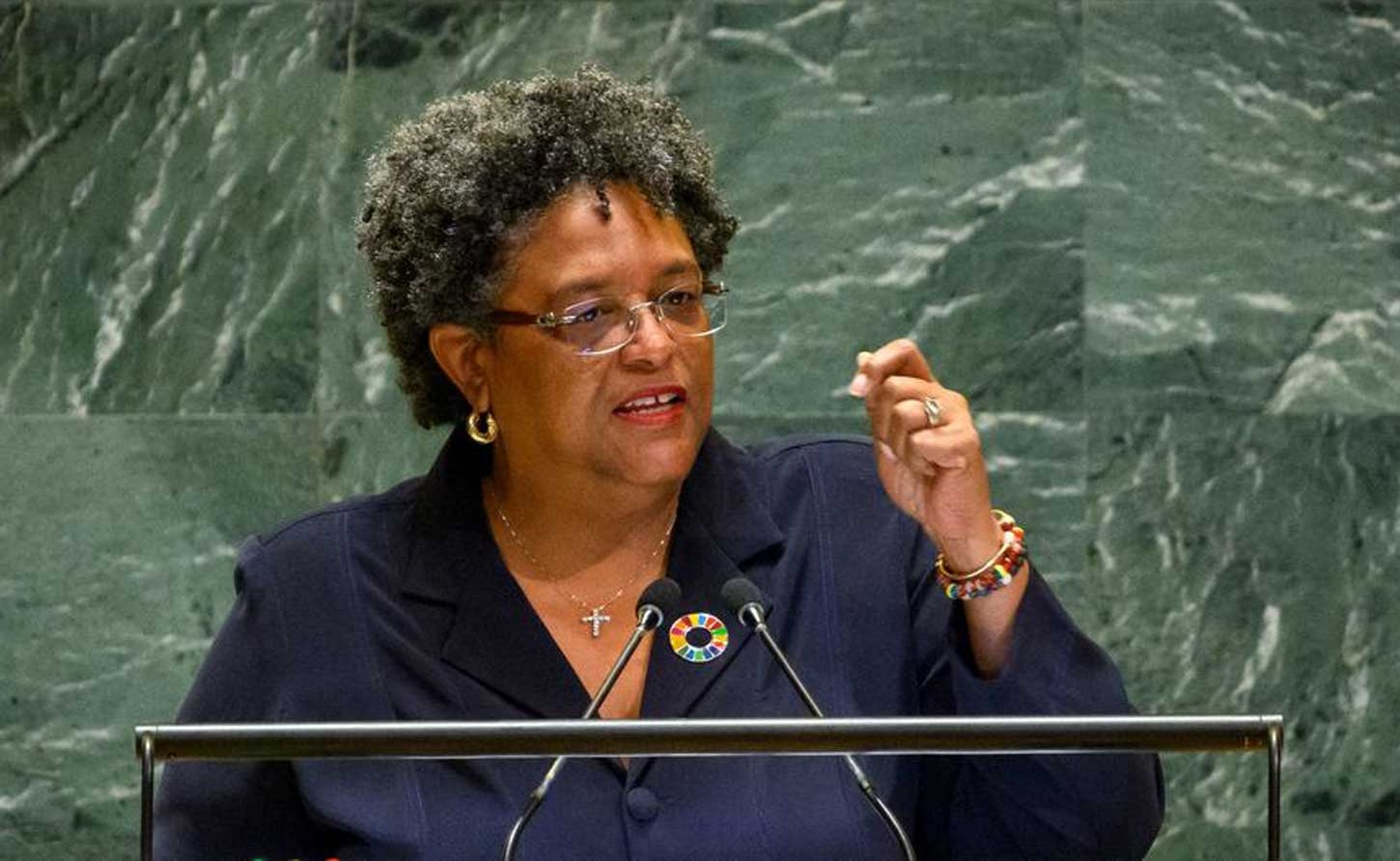Barbados PM Mia Mottley Calls for Global Reset at UN General Assembly

UNITED NATIONS, New York, NY, September 27, 2024 - In a rallying cry for global transformation, Barbados Prime Minister Mia Amor Mottley addressed the 79th session of the United Nations General Assembly on Friday, painting a vivid picture of a world at a crossroads and calling for a collective "reset" to navigate the choppy waters of multiple crises.
With the eloquence of a seasoned statesperson and the urgency of a front-line climate warrior, PM Mottley unfurled a tapestry of challenges facing humanity - from the climate emergency to post-pandemic recovery, from armed conflicts to the rising cost of living. Yet, far from dwelling in despair, she illuminated a path forward, weaving together a vision of global cooperation and equitable progress.
"These crises include the ongoing climate emergency, the aftermath of the COVID-19 pandemic, armed conflicts, rising living costs, and the silent pandemic of antimicrobial resistance, along with increasing chronic health issues," Mottley articulated, setting the stage for her call to action.
In a masterful stroke of diplomacy, Mottley challenged the status quo without burning bridges. She deftly critiqued international systems that perpetuate disparities, advocating for a more inclusive global decision-making process. Her vision? A world where small and vulnerable states are not mere spectators but active participants in shaping their destinies.
With the courage of her convictions, Mottley broached the sensitive topic of reparations for descendants of the transatlantic slave trade. She framed this not as a burden of guilt, but as an opportunity for healing and progress, advocating for a second decade dedicated to this cause.
Invoking the African principle of Ubuntu - "I am because we are" - Mottley reminded the assembly of our shared humanity and interconnectedness. This philosophical underpinning set the tone for her practical proposals, including key principles from the Bridgetown initiative aimed at reforming international financial systems and building resilience in vulnerable economies.
As Barbados assumes the presidency of the Climate Vulnerable Forum, Mottley positioned her nation at the vanguard of climate action. She artfully linked climate change, debt, and human health, calling for a symphony of nations to amplify voices and push for necessary reforms.
In a poignant appeal for global peace, Mottley lamented ongoing conflicts while offering hope for resolution. Drawing wisdom from biblical teachings, she urged nations to choose the path of peace over vengeance, envisioning a world free from the cycle of violence.
Addressing the ongoing conflict in Ukraine, Mottley advocated for peace and the right of Ukrainians to live freely within their recognized borders. She stressed that the war in Ukraine diverts resources from other nations that desperately need aid, calling for a unified commitment to achieving global peace.
Turning to issues in the Americas, Mottley highlighted the rising violence linked to the proliferation of assault weapons, particularly in Caribbean and Latin American nations. She called for a fundamental reset in attitudes toward gun control, arguing against the legitimacy of allowing assault weapons in societies not engaged in military conflict.
Addressing the situation in Haiti, Mottley urged the international community to transform its approach and provide long-term support for sustainable development and security. "We need to transform our approach and provide long-term support for sustainable development and security in Haiti," she stated. Mottley thanked Kenya for its leadership in addressing the security challenges in Haiti and called for increased financial commitments to "ensure stability and security for the Haitian people."
In a notable moment, Mottley criticized the ongoing embargo against Cuba, stating, "The embargo against Cuba is unconscionable given the dire economic circumstances facing the Cuban people." She reflected on Cuba's historical support for other nations, particularly in times of crisis, and advocated for lifting the embargo.
The Prime Minister's address reached its crescendo as she tackled specific global hotspots. She called for the recognition of Palestine, condemned violence in Gaza, and advocated for Ukraine's sovereignty. With the precision of a surgeon, she dissected issues ranging from gun violence in the Americas to the embargo against Cuba, prescribing tailored solutions for each.
Mottley's oratory reached its zenith as she recounted recent climate disasters, framing the climate crisis not as an insurmountable challenge, but as a clarion call for immediate collective action. Her words painted a picture of a world united in the face of adversity, ready to rise to the occasion.
In her stirring conclusion, Mottley left the assembly with a renewed sense of hope and purpose. Channeling the spirit of resilience embodied in a personally significant song, she cast the current moment not as an endpoint, but as the dawn of a transformative journey.Mottley concluded with a strong appeal for dignity and recognition for all nations and peoples, ensuring they are seen not just as statistics but as deserving of respect and rights.
As the echoes of her words reverberated through the hallowed halls of the UN, Mottley's message was clear: the time for change is now, and together, we can chart a course towards a more equitable, peaceful, and sustainable world. Her address stood as a testament to the power of visionary leadership in the face of global challenges, offering a blueprint for a future where every nation and every individual is seen, respected, and empowered to thrive.

 Ar
Ar  En
En